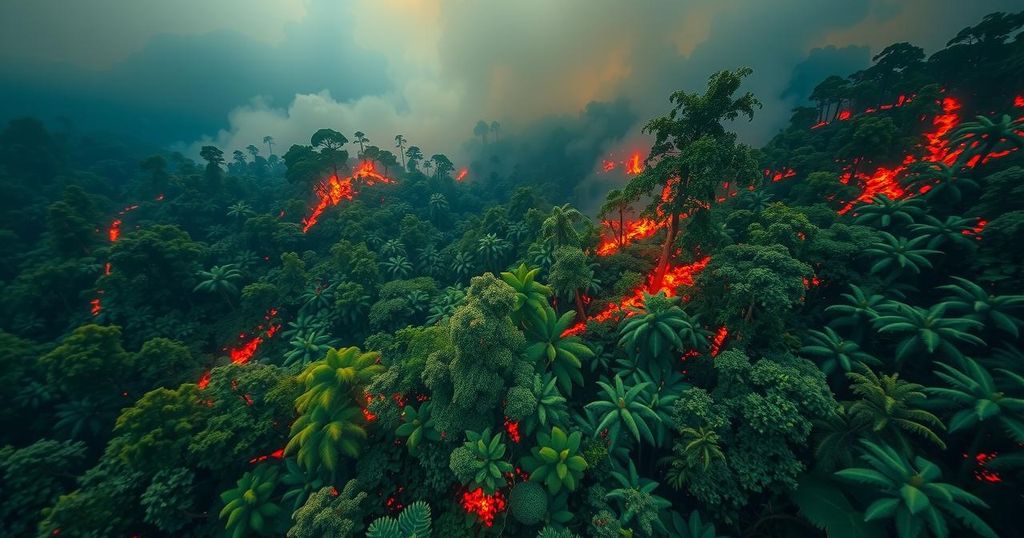Criminality Exploits Climate Crisis Amid Unprecedented Wildfires in Brazil’s Amazon

Wildfires in Brazil’s Amazon have ravaged an area comparable to Switzerland in 2024, reflecting a staggering 846% increase in burned acreage compared to 2023. This disaster, exacerbated by severe drought from climate change, has raised suspicions of criminal activity surrounding illegal land clearing for agriculture. The government is contemplating measures to enforce reforestation and revise policies to combat the increasing rates of forest degradation, pointing to a significant environmental crisis.
In Brazil, unprecedented wildfires have devastated an area equivalent to Switzerland’s size in the Amazon rainforest, potentially reflecting criminal activity reaching opportunistically in the context of climate change. Recent satellite assessments revealed that from January to mid-October 2024, the burned area increased by an alarming 846% compared to the same timeframe in 2023, marking a catastrophic wave of destruction that is unlikely to recover in the foreseeable future. This vast loss of forest was highlighted after heavy rains alleviated smoke that had cloaked the country, exacerbated by two years of severe drought, intensified by human-induced climate change and the El Niño phenomenon. Ane Alencar, the scientific director at the Amazon Environmental Research Institute, expressed grave concern over the alarming growth in fires, stating, “The data is exceptionally alarming; it’s a very abrupt surge.” ⏤ The Associated Press. In the past year, many rivers have reached record low levels, significantly impacting local ecosystems, leading to fish and endangered species fatalities as well as stranding numerous river communities. Officials suspect that illegal agricultural practices, particularly those aiming to convert forest into pasture, may be utilizing the prevailing drought conditions to facilitate easier burning of the forest without prior tree felling, essentially “weaponizing” fire. André Lima, secretary of deforestation control at the Ministry of the Environment and Climate Change, noted the extraordinary efficacy of fire ignited by only a limited number of individuals. In one instance, 500 significant fires were documented, all initiated with a match. Deforestation tactics have drastically shifted; rather than orchestrating labor-intensive tree felling, perpetrators now capitalize on the forest’s desiccated state. The Jamanxim National Forest, increasingly affected by land-grabbing cattle ranchers, has emerged as a critical site of degradation, showcasing a striking 700% increase in burned area just this past September compared to 2023. In response to this crisis, the Brazilian government is considering mandates to enforce the reforestation of burned areas as a deterrent against rampant illegal land appropriation. Lima argues for comprehensive policy reforms at both local and state levels to address the significant impacts of climate change, indicating the need for structural solutions to avert further disasters. The rise of wildfires in the Amazon represents a disturbing trend globally, compounding climate change effects. A study published in the journal Science highlighted a 60% increase in carbon emissions from forest fires from 2001 to 2023, underscoring the vulnerability of forests to such events. The distinct behavior of fires in the Amazon, where flames typically burn covering the forest floor, often does not register as traditional deforestation, illustrating the limitations of current measures to gauge forest degradation accurately. Despite the current surge in fire incidents, deforestation rates may still decline under the leadership of President Luiz Inácio Lula da Silva, potentially concluding 2024 with a 60% reduction compared to the Bolsonaro era. This shows that while deforestation metrics diminish, the broader impacts on forest health and biodiversity are critical and deserve urgent attention based on the severe fire data. Claudio Almeida of the deforestation control agency INPE remarked, “Even regions where the fire was not as intense are now severely degraded and fragile. Another season of intense drought and fires could lead to the breakdown of the forest.” ⏤ The Associated Press.
The Amazon rainforest, often referred to as the Earth’s lungs, plays a vital role in global biodiversity and carbon storage. Recent years have witnessed alarming levels of deforestation and wildfires, exacerbated by climate change and varying governance. The dual impact of severe droughts and illicit agricultural activities has led to a sharp increase in forest fires, prompting inseparable concerns about environmental degradation and its long-term ramifications. The pressure from climate-related phenomena, such as El Niño, alongside human activities, has created a complex crisis in the region, calling for immediate action to preserve its fragile ecosystems.
The alarming surge in wildfires within Brazil’s Amazon rainforest constitutes both an environmental emergency and a possible manifestation of criminal exploitation amid climate change. With a staggering 846% increase in burned areas this year, the intersection of drought conditions and opportunistic land-grabbing illustrates the urgent need for structural reforms and accountability to halt further devastation of this critical global ecosystem. As COP30 approaches, Brazil faces the challenge of balancing developmental ambitions with the imperative of safeguarding its environmental heritage.
Original Source: apnews.com





